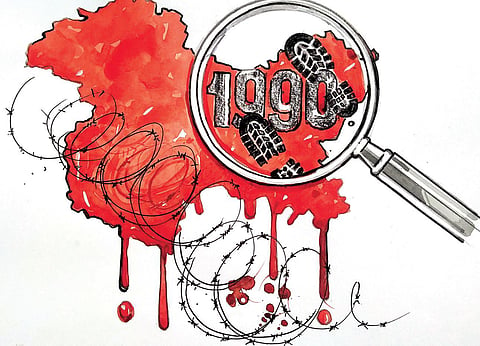

The recent film, The Kashmir Files, has triggered extreme reactions. In a country teeming with emotionally charged semi-literates, being a filmmaker, scriptwriter, storyteller, artist, playwright, public speaker, or cartoonist is an act of courage or a mark of stupidity. India is a democratic country with freedom of expression enshrined as a fundamental right in the Constitution. The maker of The Kashmir Files, based on the exodus of Kashmiri Pandits from the valley in 1990, has the same rights of expression as the maker of Parzania, the 2007 film based on Gujarat files.
Both are based on actual incidents, and both are horrific events that shook the conscience of anyone who has one. These are not the only horrors our history has witnessed as horrific incidents go. Countless ghosts are haunting the crypts of our past. India is neither unique nor special to have a bloody account. The last thousand years are filled with human misery inflicted by brutal religious and trade wars, colonisation, slavery, invasions, casteism, holocaust, nuclear wars, ethnic cleansing, and pogroms worldwide.
What is unique about India is that we shied away from telling stories from every side to preserve communal harmony. Countless films, articles and history texts get written about casteism, a stinking aspect of our culture. We get to read about historical horrors like Sati and the feudal system of medieval India. In recent times, we were flooded with documentaries, films, books, and plays on the horrible Gujarat riots; undoubtedly, a dastardly act inflicted on a hapless minority.
The anti-Sikh riot of Delhi when a giant Banyan tree fell and the earth shook, taking away thousands of innocent lives with it is also relatively well known. However, there is a deadly silence about the brutal Islamic invasions that shook the northern plains of India for a thousand years in Independent India’s storytelling space. There was nothing unique about those invasions. They were typical like any other invasions that happened worldwide in that era, marked with rapes, arson and religious fanaticism. In any other country, such events would have been taught as something that happened in the past. In India, we took care to bury them deliberately. The Portuguese inquisition in Goa that lasted for more than two centuries and perpetuated unspeakable crimes against Hindus and Muslims of that small province is never mentioned.
The exodus of Kashmiri Pandits was another of those forgotten events, hushed deliberately for communal harmony, if one takes a charitable view or for appeasement politics if one takes an uncharitable viewpoint. The people of Kashmir have been victims of power-play between nations, irrespective of their religion. They are the orphans of religious fanaticism and jingoism. That the Kashmiri Muslims also have been victims of this tragedy does not negate or nullify the real suffering of Kashmiri Pandits. You cannot cancel one misery by inflicting pain on others or ignoring theirs.
It is the storyteller’s prerogative to tell the story from a perspective of his choice. No one can dictate to the artists that they should be politically correct and preserve communal harmony. The storyteller need not balance the story by artificially following a good egg, lousy egg formula. If a film disturbs you, do not watch it and if a novel shakes your beliefs, stop reading it. If an art exhibition makes you apoplectic, fix an appointment with your nearest psychiatrist. If you find The Kashmir Files not palatable as it shows only one side of the story, please feel free to make a film that tells the other side.
If the problem of some politicians using the film as propaganda is worrying you, please remember that a shrewd politician will use anything that gives him an advantage as a tool to further his interest. Haven’t priests, kings, churches, theocrats etc, used stories, art, poetry and even architecture as paving stones in their path to power since the dawn of human history?
If the plight of the hapless Pandit is not moving you as much as the plight of a victim of Gujarat riots, caste conflicts, anti-Sikh riots or that of Palestinians, Rohingyas, Sri Lankan Tamils or vice versa, ask yourself whether it is the empathy you possess or just a tribal feeling that responds to the sufferings of only the people of your kind. We should have the courage to hear all sides and sympathise with human suffering without looking at the victim’s religion or ethnicity. Let all the hidden and buried files be opened.
Anand Neelakantan
mail@asura.co.in
Author of Asura, Ajaya series, Vanara and Bahubali trilogy